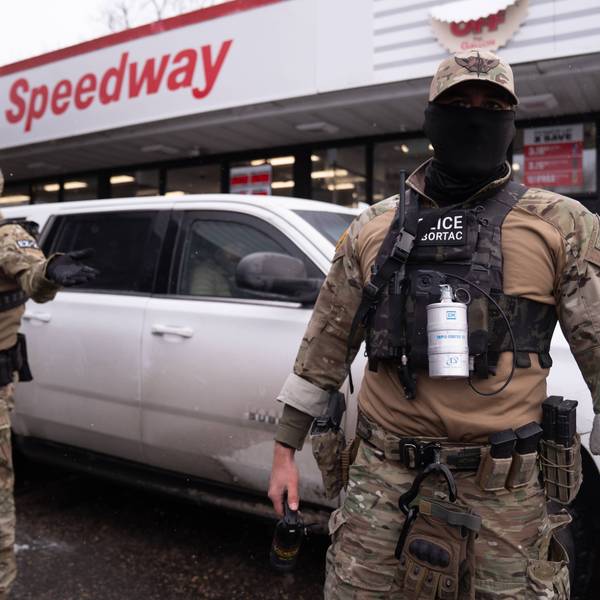The New York Police Department announced this week that it will deploy 14 new drones as part of its policing activities across New York City. The use of this highly invasive technology represents a new frontier for both public safety and abuses of power.
The mere presence of these police cameras can create a chilling effect on people exercising their rights to free speech, protest, and other lawful activities.
The department did reach out to the NYCLU to ask us for input on a draft of the policy governing the use of its drones. But while the department did make some changes based on our recommendations, we remain deeply concerned about the policy's serious shortcomings.
First, it's important to understand just how powerful drones are. The NYPD's drones are outfitted with cameras equipped with sophisticated technology and 4K resolution. The mere presence of these police cameras can create a chilling effect on people exercising their rights to free speech, protest, and other lawful activities.
Because they are so small, nimble, and relatively inexpensive, drones are in many cases much more attractive surveillance tools than, say, police helicopters. Mass-deploying helicopters is prohibitively expensive, but regularly using drones is much more feasible. And, because they are small, they can fly in places helicopters can't reach, like into a person's garage or just outside a bedroom window.
Given how easy drones make surveillance and the NYPD's troubling history of unlawful spying, it's critical that the policies that govern their use put strict limits on when and where they can be deployed.
The department's policy allows drones to be used to monitor vehicle traffic and pedestrian congestion at large scale events as well as rooftop security observation at shootings or "large scale events." But the policy does not clearly define what a "large scale event" is. The department mentioned the Women's March and Times Square New Year's Eve celebrations, but it's unclear what smaller events could trigger the use of drones.
One of our biggest fears is that these devices could be used to spy on protesters legally exercising their constitutional rights. The NYPD's policy does little to quell our concerns.
The policy also allows the NYPD's chief of department to approve requests from officers to use drones for "public safety or emergency situations." What constitutes public safety or emergency situations remains undefined, leaving wide open the possibility that those terms will be applied to a broad range of instances. We told the department that it should better define these terms, but our recommendation went unheeded in the final policy.
One bit of good news in the policy is that it specifically forbids equipping the drones with facial recognition technology. But this good news is tempered by the fact that the policy does not forbid the department from going back and using this technology on the footage captured by the drones' cameras.
Facial recognition technology is incredibly invasive and prone to error, especially when trying to identify young people and people of color. Its use on drone footage, which could potentially capture the movements of hundreds of thousands of New Yorkers, poses a severe privacy risk.
The NYPD's drone policy places no meaningful restrictions on police deployment of drones in New York City and opens the door to the police department building a permanent archive of drone footage of political activity and intimate private behavior visible only from the sky.
We raised our concerns with the NYPD, and the department did end up including a prohibition on using face surveillance on drone footage. But the final policy includes a loophole for this ban in the case of a "public safety concern." Once again, this term is undefined and could potentially create an exception so big it swallows the rule.
Finally, we recommended that the NYPD only keep footage captured by drones for 24 hours, absent specific, well-defined reasons for holding on to it for longer. The longer the NYPD keeps the footage, and the more footage there is, the greater the chances are that it will be misused.
The NYPD's final policy says footage will be kept for 30 days, but it also includes some specific--and one very non-specific--examples of when retention would be extended beyond that limit. The retention period can be extended "if the images are needed for civil litigation, subpoena production, FOIL requests, or other legal process." While "other legal process" is undefined and could constitute another troubling loophole, the other scenarios track with our recommendations.
Overall, the NYPD's drone policy places no meaningful restrictions on police deployment of drones in New York City and opens the door to the police department building a permanent archive of drone footage of political activity and intimate private behavior visible only from the sky. While we appreciate the NYPD's willingness to meet with us before it announced this program, the department should have done more to engage directly with the communities most likely to be impacted by this new technology.




